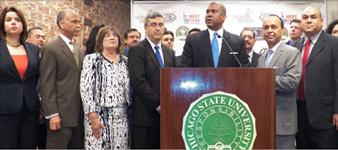Latinos deal with issues beyond immigration
By Starla Muhammad -Staff Writer- | Last updated: Apr 29, 2013 - 12:37:46 PMWhat's your opinion on this article?

“Latino Nation: Beyond The Numbers,” a two-part symposium was moderated by radio and television host Tavis Smiley and UNIVISION AMERICA will be broadcast Sunday May 5, Cinco de Mayo on C-Span TV.
|
CHICAGO (FinalCall.com) - Focusing on immigration reform is a top priority among Latinos but it is not the sole issue facing the nearly 52 million that call the United States home.
A recent panel discussion convened at Chicago State University presented a platform for various representatives of the Latino community to discuss other issues including education, economics, business, environment, health care and international events.
“Latino Nation: Beyond The Numbers,” a two-part symposium was moderated by radio and television host Tavis Smiley and UNIVISION AMERICA syndicated radio host Fernando Espuelas in partnership with the William C. Velasquez Institute on April 6. The program will be broadcast Sunday May 5, Cinco de Mayo on C-Span TV.
“It was my simple intent and interest to make sure that we could bring together the brightest minds. I’ve said many times in this community to not have a conversation exclusively about immigration reform,” said Mr. Smiley.

L-R: Ana Navarro, GOP strategist, Dr. Wayne Watson, president of Chicago State University, Mary Rose Wilcox, District 5 supervisor, Maricopa County, Ariz., Thomas Saenz, president and general counsel of MALDEF, Tavis Smiley, moderator, Rep. Luis Gutierrez (D-IL), Antonio Gonzalez, president of The William C. Velasquez Institute. Latino Nation: Beyond The Numbers brought together several leaders to discuss various issues and was the ideas of Mr. Smiley and Mr. Gonzalez. Photo: Starla Muhammad
|
Latinos are currently the fastest growing ethnic or race population in the U.S. making up 16.7 percent of the population, according to the Census Bureau. By 2050 Latinos are estimated to make up 30 percent of the population at 132.8 million.
During the 2012 presidential election, 71 percent of Latinos voted to reelect President Obama versus 27 percent for Republican challenger Mitt Romney. That fact makes the community a political force to be recognized, said Ana Navarro, a GOP strategist who was on the first panel.
“He (President Obama) better understand that he’s dealing with a more sophisticated Latino community,” she said.
Adriana Quintero, senior attorney and director of La Onda Verde de NRDC, raised environmental issues Latinos, Blacks and the poor often face. One out of two Latinos lives in an area with unclean and polluted air, she said.
“If you are undocumented and live in an area with environmental injustice, there is disproportionate suffering,” said Atty. Quintero.
The relationship between the U.S. and Latin American countries must be looked at, noted Hector Barreto, chairman of the Latino Coalition and former administrator of the Small Business Administration. He also noted second and third generation Cuban Americans have a different perspective on the Caribbean nation situated 90 miles off the coast of Florida.
Several panelists stressed the need for Black and Latino communities to work together to combat issues both communities face.
David Montejano, professor of ethnic studies at the University of California-Berkeley, said there are politicians that try to pit one group against the other.
“I thought it was a very good exposition of the richness and the diversity of the Latino community. I’m from Los Angeles and in Chicago as well it’s not new that Latinos are a big part of society, but we’re speaking to America here and Latinos are mostly concentrated in about 15 states so they get it,” said Antonio Gonzalez, president of the William C. Velasquez Institute.
“But we’ve got to talk to the other 35 (states) and hopefully we did that today not only about the very important issues of immigration reform. We touched environment, economics, civil rights, voting rights, education, foreign policy, good exchange and that is what we’re about. We’re a broad and deep community and we’re here to stay,” he added.
The symposium was divided into two, three-hour segments and recorded in front of a live audience. Portions of the program aired on television on PBS April 10-12 and public radio April 12. The entire program will air on C-SPAN April 29 said Mr. Smiley.
INSIDE STORIES AND REVIEWS
-
-
About Harriett ... and the Negro Hollywood Road Show
By Rabiah Muhammad, Guest Columnist » Full Story -
Skepticism greets Jay-Z, NFL talk of inspiring change
By Bryan 18X Crawford and Richard B. Muhammad The Final Call Newspaper @TheFinalCall » Full Story -
The painful problem of Black girls and suicide
By Charlene Muhammad -National Correspondent- » Full Story -
Exploitation of Innocence - Report: Perceptions, policies hurting Black girls
By Charlene Muhammad -National Correspondent- » Full Story -
Big Ballin: Big ideas fuel a father’s Big Baller Brand and brash business sense
By Bryan Crawford -Contributing Writer- » Full Story






 Click Here Stay Connected!
Click Here Stay Connected!








